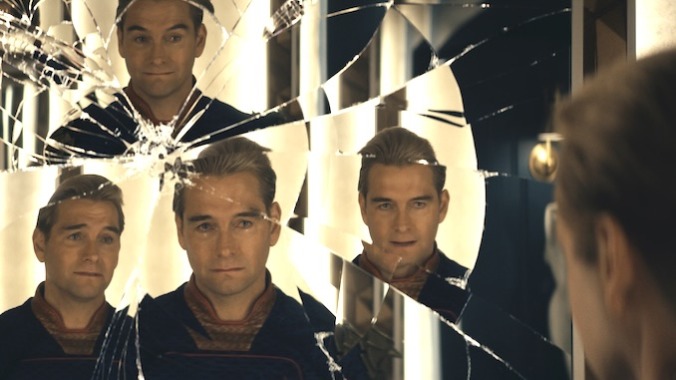The MVP: Antony Starr Makes The Boys Stronger, Smarter, and Better
Subscriber Exclusive
Photo Courtesy of Prime Video
Editor’s Note: Welcome to The MVP, a column where we celebrate the best performances TV has to offer. Whether it be through heart-wrenching outbursts, powerful looks, or perfectly-timed comedy, TV’s most memorable moments are made by the medium’s greatest players—top-billed or otherwise. Join us as we dive deep on our favorite TV performances, past and present:

When The Boys aired in 2019, Avengers: Endgame was just leaving theaters and it felt like the grip superheroes had over the entertainment industry could never be toppled. The comic book adaptation’s dark and gory take on superheroes was one of the first major protests against the consumer-friendly popcorn fodder that was superhero franchises.
But just as soon as The Boys came out, there was a clear breakout star (pun intended) in Antony Starr as Homelander. The leader of fictional superhero group The Seven, Homelander is most obviously a parody of Superman, but also the vehicle for a wider critique on American ideals to fit alongside a country that is slowly embracing fascist ideologies.
Immediately, Homelander jumped off the screen as a not-your-average TV show villain. Just as the audience thinks they understand him as a murderous psychopath, you see a grown man breastfeeding off his boss and know there is a much stranger character portrait being crafted. He’s a character that’s easy to be seen as an absurd joke (and a popular meme-originator) but Starr brings an intensity to Homelander that doesn’t just make him a better character, it makes The Boys a better show.
Homelander is a narcissist with a disregard for human life and a massive superiority complex. He is the most famous person in the world. He is also virtually unkillable while being able to murder anyone he wants in half a second. On paper, he is overpowered, too evil and all-encompassing to ever be a fair fight. He is the unstoppable force to The Boys’ immovable object: Billy Butcher (Karl Urban) and his titular ragtag gang of superhero assassins.
Starr plays the character as someone with a complete lack of inhibition, and through the series he becomes more rooted in his knowledge that he is untouchable. While at first controlled by the higher ups at Vought and his desire for approval, every act of violence further boosts his perspective of his own righteousness and God-like role in the world.
A high point of Starr’s tenure as Homelander came in Episode 2 of Season 3. Homelander, for so long puppeteered by capitalist agendas and marketability, proudly declares himself, in front of a live audience, a superior being. “I’m stronger. I’m smarter. I’m better! I am better!” It’s a conclusion he comes to after being praised by a literal Nazi—that he is the epitome of both the white race and the human race. Homelander, unlike most of the other supes in the series, was literally born and raised in a laboratory to become the most powerful being in the world and a perfect advertisement for capitalism.
But Starr portrays Homelander’s narcissism as riddled with fractures. A part of him believes himself to be better, but another part berates himself for his shortcomings. In Season 4, The Boys doubles down on his broken psyche by having these versions of himself literally appear in fractures of a mirror. His weakness in his need for love is depicted as a person that needs to be killed, just like Homelander can kill anyone else.
-

-

-

-

-

-

-

-

-

-

-

-

-

-

-

-

-

-

-

-

-

-

-

-

-

-

-

-

-

-

-

-

-

-

-

-

-

-

-

-








































